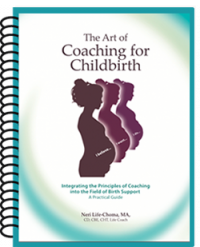
Shift Five Common Negative Mindsets with Prenatal Coaching
I have shifted the focus of my birth support toward prenatal coaching and led many birth practitioners to implement this transformational coaching approach into their birth support practice. I’ve noticed five common negative mindsets that expectant individuals may hold throughout my teaching and as I coached my own birth clients. These repeating themes can sabotage birth givers’ birth experiences, even when there is no physiological or anatomical problem. In coaching, we call these negative mindsets limiting beliefs or success blockers. Regardless of individuals’ awareness of their thought processes or beliefs, those run subconsciously like a program you downloaded and installed on your computer unintentionally. And just like a computer program, these negative mindsets may change clients’ attitudes, behavior, and the decisions they make.
A positive mindset is a key to manifesting their desired birth experience. This blog post is dedicated to coaching strategies that can shift the following common negative mindsets so that your clients can prenatally adopt a better one:
- Childbirth is dangerous.
- Childbirth is PAINFUL.
- Childbirth is emotionally and mentally challenging. I prefer to not think or talk about it.
- Natural childbirth is superior.
- Childbirth is an event that needs to be planned.
Mindset #1: Childbirth is dangerous
Childbirth used to be a dangerous event in families’ lives. In fact, it used to be a crisis for the whole community. Modern developments such as blood transfusion, antibiotics, sanitation, plumbing, family planning, and better nutrition reduced the risks involved with childbirth. Alas, the fear of dying in childbirth is still with us and can be explained as genetic memory. Carl Jung, a Swiss psychiatrist called it a “collective unconscious”– a broader concept of inherited traits, intuitions, and collective wisdom of the past. This fear might be lingering in the back of our minds while preparing for birth and throughout the experience. This fear can explain the gap between how birth givers describe their desired birth experience and their actions toward achieving it.
Coaching Strategy #1
As a transformational birth coach, you help your clients reveal this fear, get in touch with it, and then foster new habits of thinking or perspectives that will support their desired expereinces. Mantras, affirmations, visualizations, or hypnosis suggestions are all daily practices that reprogram the mind when practiced daily. The re-programmed mindset should be better aligned with your birth client’s goals and wishes for birth and will lead towards actions and decisions that serve her desired birth experience.
Mindset #2: Childbirth is PAINFUL!
From Greek mythology to the Old Testament, modern society associates birth with pain, horrific pain. Alongside this cultural belief, western culture is geared toward eliminating pain and discomfort. Expectant individuals nowadays have been offered pain medication from a very young age. Millennials were offered hormonal contraceptives that eliminate their cycle. They lost the monthly practice generations before they had when they experienced menstrual cramps and bleeding. Growing up without experiencing pain and believing that childbirth is extremely painful, how can a normal healthy individual choose to experience childbirth when they are offered a solution to block the pain?
Coaching Strategy #2
Transformational birth coaches may conduct a coaching discussion about different concepts of discomfort and pain and explore labor pain using the PAIN acronym. The goal is to distinguish fear from reality (PAIN; Purposeful, Anticipated, Intermittent, Normal.) Assign your client the task of inviting mothers to describe their labor contractions in as many words as possible other than ‘painful’ so that they have a wider range of adjectives to describe labor sensations. Have you ever heard of the math of labor contractions? Or come across the Unconscious Reaction to Labor Pain vs. Conscious Creation? Join me on Sept. 20 for a free event titled The Five Game-Changing Strategies for a Successful Birth Support Practice so that you can learn these strategies around labor pain.
Mindset #3: I prefer not to think or talk about childbirth
The notion of avoiding health-related information has a long history in psychology. Avoidance of information relating to health issues has been studied since the fifties. The study concluded that exposing individuals to fear-provoking images so that they choose to adopt healthy habits was not effective and led people to ignore the threats. With childbirth being depicted in the media as a threatening and dramatic event, or a medical emergency involving tremendous pain, no wonder many individuals avoid being informed.
Coaching Strategy #3
Helping your client adopt a healthy and positive concept of childbirth can be done with transformational birth coaching. A non-judgemental inquiry about your clients’ current beliefs about birth is the key here. Practice curiosity with no judgment. The goal is to explore what is possible and impossible based on their beliefs and how their beliefs serve them (or not). Did you ever use the fairy visit question? Clients tend to open up and talk to a fairy. They say things that they sometimes are afraid to admit to themselves or other humans. However, these ‘secrets’ are precious and can help you write a powerful affirmation.
stop using the phrase Natural Childbirth and replace it with Positive Birth Experience. In its essence, childbirth is far from being ‘Naural process” for millenials
Mindset #4: Natural childbirth is Superior
I have discussed this topic in many of my previous blog posts and webinars. The dichotomy between Medicalized Birth and Natural Childbirth originated with birth activism and has been with us since the seventies. It has led expectant individuals to believe that they need to choose between these two different experiences. Most often, the fear of labor pain will push them in the direction of choosing the medicalized experience. I urge my colleagues to stop using the phrase Natural Childbirth and replace it with Positive Birth Experience. In its essence, childbirth bears many characteristics that pose great challenges to birth givers, preventing this experience from feeling ‘natural’ for them. Women need to prepare mentally and emotionally for these challenges, and that’s why your coaching is so needed.
Coaching Strategy #4
Transformational coaches model and inspire. To help our client to avoid the dichotomy, we have to let go of it. In most births, there are medical aspects and fragments and physiological, pr natural, miracles. Additionally, you may want to avoid using the term Natural Childbirth in your marketing materials and your coaching conversations. Explore your clients’ ideal birth or positive birth experience. When you help clients connect with their inner truth about their positive experience, reflect on values and judgments that they assign to their choices. Help them see that if they commit to a certain experience only because they think it’s superior, they probably won’t be able to manifest it. The process of transformational birth coaching helps them become their own authority and prepares them for parenthood.
Mindset #5: Does your client think childbirth is an event that needs to be planned for and organized?
Many expectant persons perceive childbirth as an event and enroll themselves, or their doula, as project managers, thinking, “I need to get the task done and achieve the result – best event. However, the unpredictability of childbirth makes it impossible to apply the project approach to it. There are so many variables involved in childbirth that we cannot control – the physiology and anatomy of the mother, the coping and collaboration of the baby with the birth process, fetal position, and many more.
Coaching Strategy #5
When we help our clients to perceive childbirth as a process, they understand that they can only be accountable for their optimal performance and not how things went. Transformational birth coaches can facilitate this clarity during the process of writing the birth plan. You can help your clients to have a vision of their birth process rather than a preference list. I like introducing this concept to my clients by talking about a shopping list. If shopping is a project and I come home not buying 3 items on my list- two items that I didn’t find and one that I forgot to buy- then my project has not been successful. However, if shopping is an experience or a process, then with the same outcome, I can be satisfied if I’m acknowledging that I ran into an old friend and saw a rainbow on the way back home.
Accountability to the process with no attachment to the outcomes is a game-changing principle in birth support. Birth support figures often are natural birth activists who idealize natural childbirth. Coaching for childbirth is a transformational process during which birth clients learn to be accountable, but only for what’s in their control. They can own their actions toward achieving their desired birth, but they can’t be accountable for the outcome. In this respect, it is the best preparation, not only for childbirth but for what follows – parenting. Transformational birth coaches manifest and model this understanding throughout the prenatal coaching process. By doing so, they increase their clients’ chances of high satisfaction with how they conduct themselves, all the way from conceiving to postpartum.
- Overshadowing the Transformative Essence of Childbirth with Data - July 10, 2024
- Navigating the Epidural Dilemma - May 28, 2024
- Informed Decision in Birth Support: A Myth of Empowerment? - April 29, 2024


